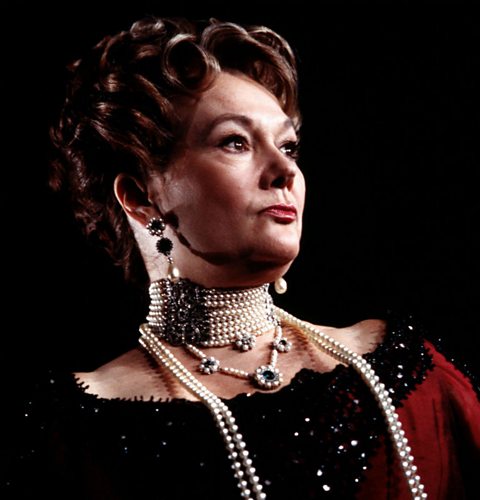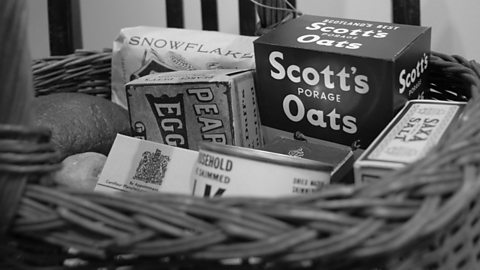Mrs Sybil Birling in An Inspector Calls

Mrs Sybil Birling is Arthur Birling's wife and right from the opening of the play she is cold-hearted and snobbish despite being a prominent member of local women's charity. Throughout dinner she tells Sheila and Eric off for things that she considers impolite whilst ignorantly turning a blind eye to her son drinking too much. It is clear that despite Eric being old enough to drink and Sheila getting married, she sees them both as children, not as a young man and woman.
Her cold, uncaring nature leads to her downfall as the Inspector forces her to unknowingly condemn her own son.
| How is Mrs Birling like this? | Evidence | Analysis | |
| Cold | Mrs Birling is very unsympathetic when describing Eva Smith's position. Sybil assumes instantly that because Eva is pregnant and single she is a bad person. | "She was claiming elaborate fine feelings and scruples that were simply absurd in a girl in her position." | She assumes that just because Eva is unmarried and pregnant that she is unable to have 'fine feelings', a very cruel and cold opinion to have. |
| Ignorant | When the Inspector suggests that Eric is used to drinking, Mrs Birling jumps quickly to Eric's defence. | "No, of course not. He's only a boy." And later "(staggered) it isn’t true." | She shows her ignorance in two ways, first by defending Eric 'of course not' when the Inspector suggests that he is used to drinking. Secondly by stating that Eric is only 'a boy'. He is not a boy but a young man, Sybil refuses to see this. Her shock at this revelation '(staggered)' is further evidence of this. |
| Snobbish | Sybil shows that she is snobbish when she criticises members of her family for their behaviour. | "What an expression, Sheila! Really, the things you girls pick up these days!" | Sybil shouts at Sheila for using the word 'squiffy' - meaning drunk. Sybil has snobbish opinions that people should speak and behave 'properly', not doing so would make her look down upon them. |
| Cold | |
|---|---|
| How is Mrs Birling like this? | Mrs Birling is very unsympathetic when describing Eva Smith's position. Sybil assumes instantly that because Eva is pregnant and single she is a bad person. |
| Evidence | "She was claiming elaborate fine feelings and scruples that were simply absurd in a girl in her position." |
| Analysis | She assumes that just because Eva is unmarried and pregnant that she is unable to have 'fine feelings', a very cruel and cold opinion to have. |
| Ignorant | |
|---|---|
| How is Mrs Birling like this? | When the Inspector suggests that Eric is used to drinking, Mrs Birling jumps quickly to Eric's defence. |
| Evidence | "No, of course not. He's only a boy." And later "(staggered) it isn’t true." |
| Analysis | She shows her ignorance in two ways, first by defending Eric 'of course not' when the Inspector suggests that he is used to drinking. Secondly by stating that Eric is only 'a boy'. He is not a boy but a young man, Sybil refuses to see this. Her shock at this revelation '(staggered)' is further evidence of this. |
| Snobbish | |
|---|---|
| How is Mrs Birling like this? | Sybil shows that she is snobbish when she criticises members of her family for their behaviour. |
| Evidence | "What an expression, Sheila! Really, the things you girls pick up these days!" |
| Analysis | Sybil shouts at Sheila for using the word 'squiffy' - meaning drunk. Sybil has snobbish opinions that people should speak and behave 'properly', not doing so would make her look down upon them. |
Social and historical context

The hardships of wartime challenged the class structure in Britain. Due to rationing of food and clothes, people of all classes were eating and dressing the same. They were also fighting side by side, and so class barriers came down. Sybil Birling, like her husband Arthur, represents a type of middle-class snobbery that existed prior to the World Wars. Priestley hoped that these sorts of attitudes would die out, and uses Mrs Birling to show how they can lead to cold and thoughtless behaviour.
Analysing the evidence
Secondly, I blame the young man who was the father of the child she was going to have. If, as she said, he didn't belong to her class, and was some drunken young idler, then that's all the more reason why he shouldn't escape. He should be made an example of. If the girl's death is due to anybody, then it's due to him.
Question
How does Priestley show Mrs Birling to be an ignorant and cold character?
How to analyse the quotation:
"Secondly, I blame the young man who was the father of the child she was going to have. If, as she said, he didn't belong to her class, and was some drunken young idler, then that's all the more reason why he shouldn't escape. He should be made an example of. If the girl's death is due to anybody, then it's due to him."
- "Secondly, I blame the young man" - Mrs Birling is being arrogant and it is clear she thinks she is right.
- "he didn't belong to her class… that's all the more reason why he shouldn't escape." - she thinks that because they weren’t in the same class the problem is worse
- "If the girl's death is due to anybody, then it's due to him." - Sybil coldly blames the father of the child here and doesn’t accept that anyone else could be to blame.
How to use this in an essay:
Mrs Birling is being very arrogant, it is clear that she thinks that she is right "Secondly, I blame the young man" shows that she also has a very ignorant point of view. She brings class into her argument, suggesting that because 'he didn’t belong to her class' then 'that's all the more reason why he shouldn't escape'. Here she suggests that just because the boy might be from a higher class than the pregnant Eva Smith, then the pregnancy is somehow worse and that he must not be allowed to 'escape'", as if having a baby with someone of a lower class is a terrible crime. Finally, she coldly and ignorantly suggests that no one else is to blame other than the man 'If the girl's death is due to anybody, then it's due to him'. Of course, she has no idea that the baby’s father is her own son. She clearly has learned nothing from the Inspector so far.